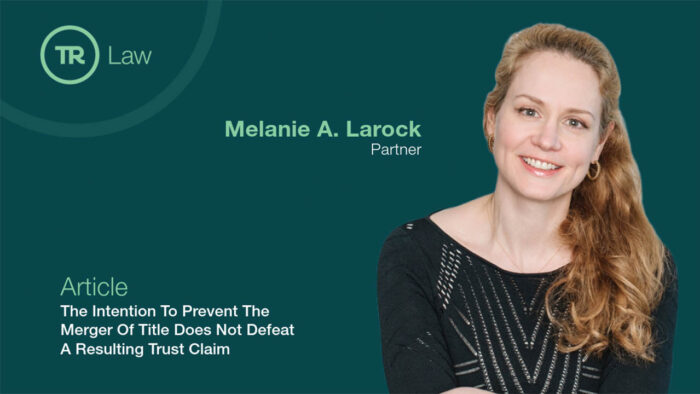The Three Faces of The “Any Occ” Test
Author(s): Michael L. Bennett*
February 1, 2007
At the 104 week anniversary of a motor vehicle accident, the victim will only be entitled to continue to receive income replacement benefits pursuant to the Statutory Accident Benefits Schedule if he or she is “suffering a complete inability to engage in any employment for which he or she is reasonably suited by education, training or experience”. Similarly, 104 weeks after the victim first begins to receive long term disability benefits, the test for continued entitlement under most disability policies also changes from an “own occupation” test to an “any occupation” test which is quite similar to the test set out in the Statutory Accident Benefit Schedule. Each policy of disability insurance is different and therefore, the post 104 “any occ” test may be somewhat different to some degree from the post 104 “own occ” test for accident benefits.
As the two year anniversary of a motor vehicle accident nears for these victims, the Accident Benefits and Disability Insurers usually want to determine whether a victim will be able to re-integrate themselves back into the workforce in any capacity and therefore fail to satisfy the “any occ” test. Around this same time, motor vehicle accident victims must begin to put their minds to whether they qualify for a “disability pension” from the Canadian Pension Plan. Once again, a separate but similar test is to be applied with respect to eligibility under this federal compensation plan. The test for Canadian Pension Plan Disability Benefits is whether the victim is “incapable regularly of pursuing any substantially gainful employment”.
In order to prepare the victim to receive these three benefits which may be available as the 104 week anniversary approaches, the seriously injured victim must consider attempting some type of vocational retraining or make some attempt to reintegrate themselves into the workforce. The big question facing seriously injured victims at this juncture is whether the victim is obliged to take any job whatever the pay or essential duties, failing which, will the victim risk losing his or her Income Replacement, Long Term Disability and/or CPP disability pension benefits?
ACCIDENT BENEFITS
In the landmark Financial Services Commission of Ontario decision Terry and Wawanesa Mutual Insurance Company, Arbitrator Palmer provided the following guidance to automobile insurers in helping them understand the true meaning of the “any occ” test:
“Somehow the ability to engage in a reasonably suitable job, considered as a whole, including reasonable hours and productivity must be addressed. In my view, Mr. Terry has convincingly demonstrated in his attempt at a work trial that he is completely unable to engage in a sedentary job for which I find he was reasonably suited. He would be unable to consistently attend and sustain a reasonable number of hours of employment as a taxi dispatcher or any similar job.”
What we have learned from the Terry and Wawanesa F.S.C.O. A00-000017 [2001] decision and other arbitration decisions at the Financial Services Commission of Ontario that have followed, is that the automobile insurer should consider the following factors when it considers whether a person satisfies the “any occ” test:
- Is the victim substantially unable to perform the essential tasks of a proposed employment?
- Is the victim capable of performing employment commensurate in nature, status, remuneration and hours with the victim’s pre-accident employment? and
- Will the victim be able to perform the proposed work at a competitive level with other employees?
LONG TERM DISABILITY
The notion of entitlement to long term disability benefits after 104 weeks has been considered for some time in the jurisprudence. However, one difficulty a victim may encounter when dealing with entitlement to long term disability benefits is the different wording of each policy that to some degree changes the meaning and interpretation a court will give to the “any occupation” test under the specific policy. That said, the courts who have considered these various tests have asked themselves the following fundamental questions regarding the test for Long Term Disability entitlement which may be set out as follows:
- Does the proposed occupation consider the victim’s pre-accident “education, training or experience”?
- If the victim is required to retrain to engage in a new occupation, is the retraining commensurate with the victim’s interests, abilities and aptitudes?
- Is the proposed occupation right for “this victim” looking at all the victim’s life circumstances and experiences including the proposed occupation’s salary, status and remuneration?
CANADIAN PENSION PLAN DISABILITY PENSION
The leading case for entitlement to a disability pension under the Canadian Pension Plan is the Villani v. Canada (Attorney General) [2001] F.C.J. No. 1217, a decision of the Federal Court of Appeal. The crux of the appeal turned on whether the test for entitlement to a CPP disability pension is an objective one, or whether it was appropriate for an adjudicator to consider a victim’s “education, training and experience” and “business reality”. The Pension Appeals Board in Villani stated that the words “incapable of pursuing any substantially gainful employment” suggested an objective test where the availability and likelihood of obtaining suitable employment should not be considered.
Upon appeal at the Federal Court of Appeal, this court refused to accept that an inquiry into a person’s ability to engage in any substantially gainful occupation should remain blind to “real world” considerations. Instead, this Court adopted a “real world” or “business reality” test that requires the consideration of an applicant’s background, medical condition and the availability of alternative employment. Hypothetical occupations cannot be divorced from the particular circumstances of the applicant such as age, education level, language proficiency and past work and life experience.
KEY CONSIDERATIONS
Therefore, when considering whether there is a reasonably suitable job for victims who continue to suffer from impairments after 104 weeks, the proposed occupation must be considered as a whole and then held up against the victims’ past experiences and existing impairments. The following questions should be considered: does this job have reasonable hours in light of the victim’s impairments? Can the victim be productive at this job? Does this occupation take the victim’s pre-accident academic and vocational training into account?
Does this occupation take into account the victim’s pre accident job status and remuneration received? These questions must all be addressed prior to an Automobile Insurer or Disability Insurer denying income benefits after 104 weeks. And since Villani, these same considerations will be relevant when applying for a CPP disability pension.
This article appeared in the Jan. 12, 2007, issue of The Lawyers Weekly published by LexisNexis Canada Inc.
Share this








